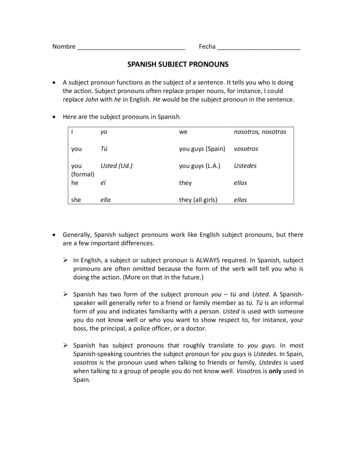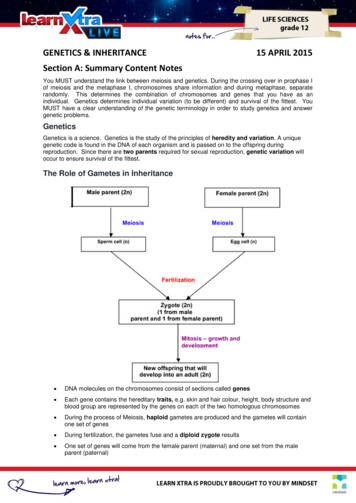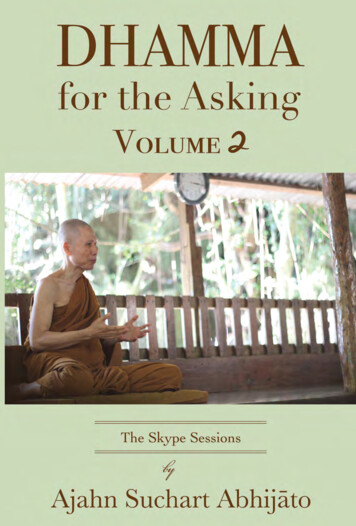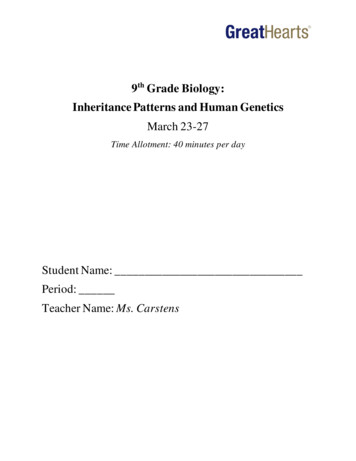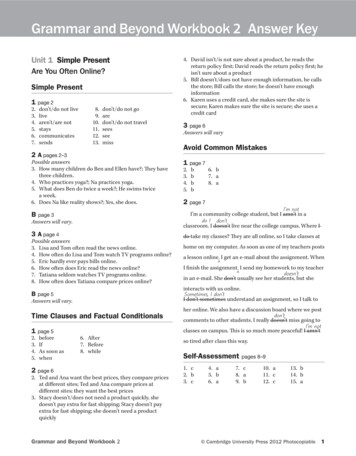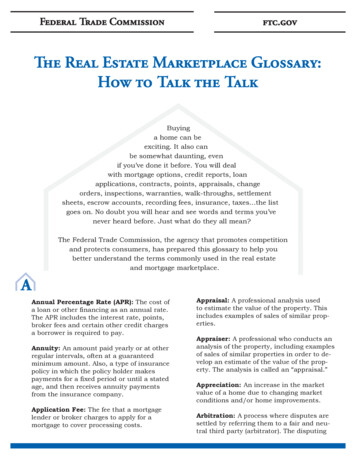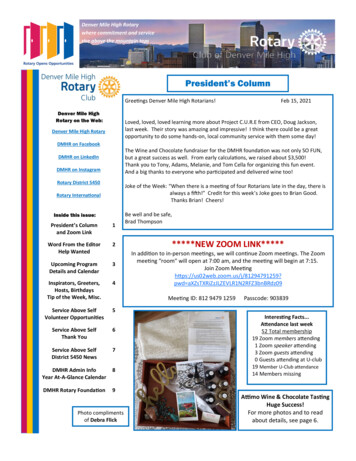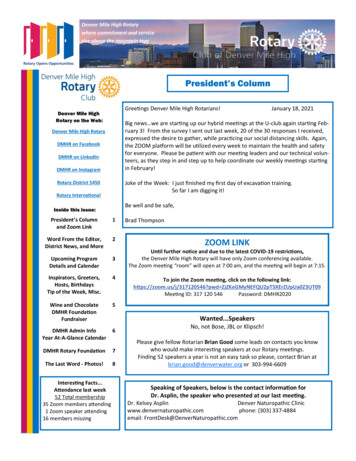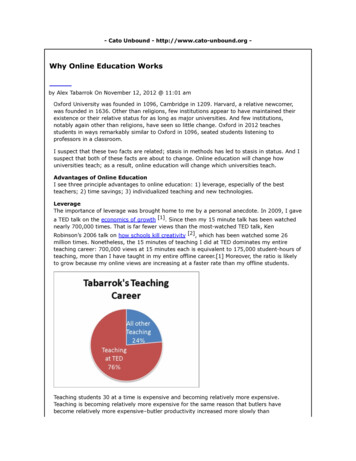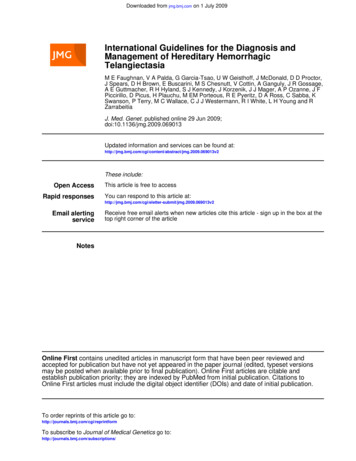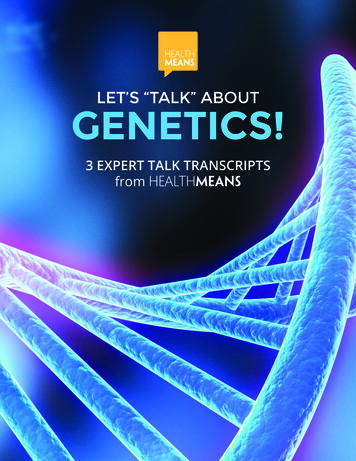
Transcription
LET’S “TALK” ABOUTGENETICS!3 EXPERT TALK TRANSCRIPTSfrom HEALTHMEANS
CONTENTSEnjoy learning from these experttalk transcripts pulledfrom the thousands of talksin our HealthMeans library!If you’re already a member ofHealthMeans, you can accessthe video interviews of thesetalks to the right:If you’re not yet a member,be sure to sign up to accessthese interviews!Changing YourGene ExpressionWe’re happy that you’re takingtime to learn about living ahealthier and happier life, and wehope you’ll make us a regular partof that journey!Express the Powerin Your DNAFrom the entire HealthMeansteam, thank you for downloadingthese transcripts—we hope youlearn a lot from them!Mark Hyman, MD withDeepak Chopra, MDClick here to watch this interview!Alicia Lynn Diaz, MA, AHP withCharan Surdhar, BSc, MScClick here to watch this interview!Genetic Defectsand MTHFRWendy Myers, FDN-P, NC, CHHCwith Sterling HillClick here to watch this interview!
Changing YourGene ExpressionMark Hyman, MD with Deepak Chopra, MDClick here to watch this interview!The purpose of this presentation is to convey information. It is not intended todiagnose, treat, or cure your condition or to be a substitute for advice from yourphysician or other healthcare professional.Ayurveda and lifestyle and put ittogether in this new book.Dr. Hyman: Hey, everybody. Thisis Dr. Mark Hyman. Welcome toThe Fat Summit, your chanceto separate fat from fiction. I’mhere with my good friend, Dr.Deepak Chopra, who is an amazingpioneer in the world of wellness.He has written over 80 books, 43languages, and 22 New York Timesbestsellers. I feel like a slacker.I only have nine New York Timesbestsellers. He’s an internist, anendocrinologist. He has really beena leader in the space of wellness,and his new book is amazing withDr. Rudy Tanzi, which I’ve read,called “Super Genes” about how tochange your gene expression bychanging your inputs, your thinking,your feelings, your environment,your diet, exercise. All those thingschange your genes.We’re going to talk today aboutlifestyle, your genes, fat, and putit all together for everybody. Ithink one of the striking thingsabout your work is from the verybeginning, you’ve talked abouthow to create balance, and you’vetalked about Ayurveda very earlyon in your book,” Perfect Health,”which I read. It really talks aboutusing food as a therapeuticagent and food as more than justcalories. I’d love you to share,from your perspective now after30 years, how that has changedand how diet is influencing yourgenes and how you’ve gatheredthese insights from your work onDr. Chopra: Well, the book is called“Super Genes,” and when I say“Super Genes”, it’s a combinationof the activity of your genome,your microbiome, and what we callthe epigenome. We are born with23,000 genes. That’s what startedour life after your parents cameback from that picnic. That’s howwe started, but then on the way outfrom the mother’s womb, and thenshortly thereafter, we acquired 3.3more million genes, so 150 timesmore genes that are of bacterialorigin. The number of bacteriaoutnumbers our cells 10 to 1, butthe number of bacterial genesoutnumbers our human genes by afactor of 150 to-Dr. Hyman: So we’re less than 10%human then.Dr. Chopra: Yes, less than 10%.We are a few human cells hangingon to a bacteria colony. Weare the awakening of bacterialconsciousness.Dr. Hyman: I love that.Dr. Chopra: Which decided tosay, “Who am I?” Anyway, so that’sthe microbiome, and then there’swhat is now called the epigenomewhich is a shell of proteins outsidethe gene, and these proteinsactually influence gene activity aswell. There’s what we call trafficof information between theepigenome, the microbiome, andthe human genome through variousmetabolites, and are producedprimarily by the microbiome inour gastrointestinal tract. So themicrobiome actually is the first thingthat food comes into contact with.The microbiome being the ecologyof the Earth, literally, it doesn’t likeantibiotics. It doesn’t like hormones.It doesn’t like insecticides orpesticides or petroleum productswhich go in the making ofinsecticides.Dr. Hyman: They’re on our food.Dr. Chopra: Yeah, and it doesn’t likealcohol, truly speaking.Dr. Hyman: That’s too bad.Dr. Chopra: It doesn’t like anythingartificial. It doesn’t like anythingthat’s refined, manufactured,processed, GMO because again,GMO interferes with its ecology. Itis the life of the Earth, and whenit gets inflamed, it sends outmetabolites that cause disruption ofthe activity both of the epigenomeand of the gene directly. In addition,your genome, your epigenome,which is a group of proteinsprimarily what are called histones,they react to everything from sleepto emotions to stress to exercise tomovement to breathing to food,of course.So this is the integrated activitywhich we call the super gene. ToAyurveda, Ayurveda has always
said food that comes directlyfrom nature is the best food, andthat food has six tastes: sweet,sour, salty, bitter, pungent, andastringent.The combination of sweet, sour,and salt, it slows down yourmetabolism. Bitter, pungent,astringent speeds up yourmetabolism. Astringent, bitter,sweet is anti-inflammatory, butsweet doesn’t mean refined sugar.Sweet means anything that evenhas a sweet aftertaste. Complexcarbohydrates and fats areconsidered sweet. I read that theyuse fats like ghee, fats derived fromplant products, nuts and avocados.These fats, and ghee of course,which is very concentrated fat,derived from milk, but if that fatis used in the absence of refinedsugar, it’s what is called lipophilic.It helps the membrane of the cellsabsorb other micro-nutrients. So fatis good as long as you’re not havingrefined sugar. If you’re havingrefined sugar with the fat,it’s devastating.Dr. Hyman: That’s called sweetfat. That’s the problem. It’s thedonuts, it’s the flour fried in fatthat really causes the problems.It’s so fascinating to me that youconnected the genes with theepigenome, with the microbiome.It’s all one super gene.Dr. Chopra: It’s one system.Dr. Hyman: Yeah. The power of ourdiet to regulate that is enormous,and it’s affecting everything.Dr. Chopra: Of course it’sconnected to every other activity.If you don’t have good sleep, youmess up hormones called leptinand ghrelin which not only altermetabolism but change the wayyou perceive satisfaction fromfood, what is called the satietyfactor, which then builds up theabdominal fat, your belly fat whichthen becomes an endocrine organby itself because it’s all just steroidmetabolism. So how we live ourlife, how we manage stress, how werelate to other people through loveor compassion or joy or equanimity,these things influence everythingthat’s happening in our metabolism.Dr. Hyman: That’s true. I’vebeen reading recently about thesocial genome, how our socialconnections, or social relationships,our interactions with another canactually, literally in real time changeour gene expression for better orworse. If it’s a good interaction,it makes you have better geneexpression, reduces inflammation,and helps you be healthier. If it’sa bad interaction, it can do theopposite. Is that what you found?Dr. Chopra: Yes. Actually westarted the first study down hereat the Chopra Center was just ameditation. Within four and a halfdays we found that the essentialarmories which regulate the lengthof telomeres or chromosomes, itwent up 40%, but just in 4 days.This study was in collaborationwith Elizabeth Blackburn and herteam Nobel laureates, but we hadsaved the blood, so we sent itto our friends at Harvard, Rudy.Also at Mount Sinai, Eric Schadt.What they found was that all thegenes that are involved in thehealing or self-regulation, or whatyou and I would call homeostasis,they were up-regulated. Theiractivity went up, and all the genesthat were involved in excessiveor inappropriate inflammation,which is a factor in everything frominfections to autoimmune illnessesto inflammatory bowel diseaseto many types of cancer, thosegenes went down. In fact, we nowhave a genetic signature for justmeditation.another study which involvesbreathing techniques, especiallythose that involve the vagus nerve.As you know the vagus goes fromthe midbrain to the lungs to theheart to the abdominal organs.We are finding that even simplebreathing techniques like ujjayibreathing, or when you raise yourhands up like this and inhale orcat cow in yoga, they stimulate thevagus nerve which changes themicrobiome which actually shootsup oxytocin, dopamine, opiates,serotonin, back to the brain. Thevagus not only regulates your heartrate availability, which is a measureof stress, but actually helps youbreathe slower, stimulates theparasympathetic nervous system,changes the microbiome, changesinflammatory markers, changesleaky gut, changes the way the brainworks. It’s amazed that we neverknew all this, that yoga did this, butpeople feel good after yoga, right?Dr. Hyman: It’s true. I love yoga. Ido it, and I always feel transformed.It’s amazing that not only yourgenes are listening to yourthoughts, but your microbiome,the bacteria are listening to yourthoughts.Dr. Chopra: Yeah, the bacterialgenes are listening to yourthoughts. What we’re also findingis the combination of food andsomething that you believe in,detox. So if you give people highfiber, if you do a mild cleanse, ifgive them vegetables that are highin fiber like cabbage or radish orcelery, combined with some ofthese Ayurvedic herbs which are ,that then serves as a combinationof what we are calling prebiotic,probiotic, and symbiotic. Soprebiotic is the high fiber that yourbacteria, microbiome, they munch itup because they like it.Dr. Hyman: Amazing.Dr. Hyman: It’s their food.Dr. Chopra: Now we’re doingDr. Chopra: It’s their food. Now you
add to it this Ayurvedic stuff andyou have something which is prettydevastating combination for wellbeing.Dr. Hyman: It’s unbelievable.So you can influence it by yourthoughts, but also your diet.That’s what’s so stunning to meand Ayurveda that as part ofthe detoxification process calledPanchakarma, they use verylarge amounts of ghee which isa saturated fat that we alwaysthought for years was bad, and yetit’s used as a therapeutic agent inAyurveda. Can you explain that?Dr. Chopra: In combination with nosugar and high fiber, and all theseprebiotic foods, it becomes actuallysomething that facilitates thetransport of micro-nutrients andalso become something that is partof the detox. Our new study whichis called SBTI Initiative again withHarvard, UCSF, UCSD, Duke, andScripps, and our own institution.We are looking at Panchakarma.We’re calling it SBTI, Self-directedBiological Transformation Initiative.And where we’re looking at theeffect of Panchakarma, the food,the detox, but also sleep, yoga,pranam, movement, and healthymotions all combined.Dr. Hyman: That’s great. All of itare the inputs for your genes. Now,going back to your training as anendocrinologist many, many yearsago, and you practiced and studieddiabetes. How is the thinkingaround diabetes and fat and sugarchanged since you started training?Dr. Chopra: We know that type2 diabetes is curable, reversible,if you help people achieve idealbody weight. What I didn’t knowwas that when you have somethingcalled leaky gut, for example, whichhappens when people are stressed,the enzymes in the gut, thanks to aninflamed microbiome, leak into thecirculation. They can eat up someof your islet cells, so you can evenget type 1 diabetes from leaky gut.We did a study here, a preliminarystudy where people kept a gratitudejournal every night and leaky gutwent down and inflammatorymarkers went down. All this isimplications for heart disease,diabetes, not only type 2 but type 1.Dr. Hyman: Yeah, we’ve beenstudying leaky gut in functionalmedicine for over 25 years. It’sreally one of the central ways wetreat people with a whole host ofchronic diseases from autoimmunediseases to mood disorders toweight and metabolism issues. Withtype 2 diabetes, we used to thinkthat they should be on a low fatdiet, right? We used to give peoplelow fat diets, and it actually seemedto have backfired, and now we lookat the studies and it seems like itsmore high fat.Dr. Chopra: Yeah, high fat, but lowglycemic food at the same time.Dr. Hyman: Right. That’s the key.Dr. Chopra: That combination isthe key.Dr. Hyman: Yeah, the sweet fat isbad. No sugar with your fats; juststraight fats. Yeah, it’s amazing.In terms of the thinking aroundhow spirituality affects all of this,how does spirituality affect yourmicrobiome, your genes, yourhealth, even your food intake, andall those things? How does that allconnect?Dr. Chopra: Let’s define spirituality.Spirituality has been in stages ofgrowth and development. Thebeginning I think you can justifyspirituality as self-awareness; anawareness of body; an awarenessof mental space, which is thoughts,feelings, emotions; awarenessof relationship; and awarenessof what’s happening inside youwhich is some of the techniquespratyahara in yoga, and allthose things. This is the wheelof awareness that the Buddhadescribed. There’s awareness,and then there’s all the things wecan be aware of. First are the fivesenses: sound, touch, sight, taste,and smell. The second is body,muscular, skeletal system which youcan develop awareness of viscerawhich is called introspection. Youcan develop awareness of mentalspace and then you can developawareness of relationship.All of these things facilitate selfregulation and healing biologically,there’s no question about that.That’s what we’re looking for.And there are other aspects tospirituality. Intuition, creativity,insight, our consciousness, stateof consciousness that takes youbeyond waking, dreaming, sleeping,intuition, what is called cosmicconsciousness, transcendentalconsciousness, unity consciousness,divine consciousness. Each of thesestates has its own biology, has itsown biological expression. So aswe move into what I call nonlocalsense of awareness, your bodyactually starts to change physically.You’ll experience it more as lighterbody, you experience it more asenergy, lightness of being, and thathas biological counterparts. Now,not many people have studied this.We are beginning to study. We’relooking at brainwaves, heart rateviability, and the correlation withbreath. It’s very interesting thatwhen your breath slows downor when it becomes deeper ormore regular, everything changes.Brainwaves, heart rate viabilitychanges, gene activity changes, selfregulation gets amplified.Dr. Hyman: Yeah. I know youare probably aware of RichardDavidson’s work on this; the superOlympic meditators who havebeen in caves for years, for tens ofthousands of hours and their brains
look completely different.Dr. Chopra: Yes, yes. One thingwhich we are beginning to see isthat your parasympathetic nervoussystem, your breathing, and yourthoughts mirror each other. Soyou can use any one of thosewhether it’s breathing or influencingthe parasympathetic nervoussystem through yoga practicesor just calming the mind throughmeditation. They all synchronizeeverything else that’s happening.Dr. Hyman: That’s right. Andyou don’t have to be an Olympicmeditator. They’re finding evena few short weeks of meditatingregularly you’ll see profoundchanges.Dr. Chopra: That’s right. We saw itin four days.Dr. Hyman: Unbelievable. So goingback to food and diet how doesone figure out the best diet to eatto optimize their genes? What haveyou found in terms of optimizinggene expression, microbiome, andthe epigenome? How does that sortof shake out in 2015 for us?Dr. Chopra: I don’t take anythingthat’s refined, manufactured,or processed, has chemicals,steroids, hormones, antibiotics,or is genetically modified. That’sa given. If you do eat meat andpoultry or fish, use it sparingly. Tryand eat fish; high fatty fishes aregood, salmon, etc. Then make sureyour food comes farm to table.Look at the food. I frequently tellpeople just look at the food andask yourself, “If I eat that, how willI feel,” not 20 years from now, butone hour from now. Twenty yearsfrom now you can say, “Yeah, that’sgoing to cause cholesterol plaques,”but nobody worries about that.How will I feel one hour from now?Will I feel more energetic, or will Ifeel lethargic? That you can tell justby looking at food. Take a pictureof the food with your iPhone, orwhatever. Look at it and say, “Doesthis make me feel vital, energetic,and joyful? Does it make meexperience lightness of being, ordoes it give me a slump?You can tell that just by looking atthe food.Dr. Hyman: That’s pretty simple,straightforward.Dr. Chopra: It’s very simple.Secondly, when you eat, eatconsciously — what is calledmindful eating — because if you’redistracted, or if you’re upset, orif you’re stressed, the same foodwill be metabolized differently.The neuropeptides that occur as aresult of our state of consciousnesscan transfer the food into anymetabolic pathway in respect towhat it contains. If you’re making alot of adrenaline or cortisol becauseyour mind is agitated, and you’redistracted while you’re eating food,the same food can be shunted intoa metabolic pathway that is toxic,that can cause inflammation.Dr. Hyman: So even if you’restressed about your food, andyou’re stressed about your life,if you’re eating good food, it stillmight not be good for you, is whatyou’re saying?Dr. Chopra: Yeah, you can get thebest food to a stressful person, andthey’ll make poison out of it. On theother hand, if you’re enlightened,then it doesn’t matter what food.Dr. Hyman: Then you can eatbacon? Amazing, that’s incredible.I think the diet part is so powerfulbecause it’s the biggest thing wehave to interact with our genesevery day. Like you said, it’s thebiggest interaction with ourmicrobiome and also our genes.It’s really information from thefunctional medicine perspective.Food is not just calories; itsinstructions and information.Dr. Chopra: Yeah, it’sconsciousness. Because inAyurveda we recognize that there’sa saying, “Food is Brahman.” It’sconsciousness, and so there arefoods that will actually causeinflammation not only of the bodybut also the mind.Body and mind, you can haveinflammatory emotions which cancause inflammation in the body,and inflammation in the body willcause inflammation in the mind,and food affects that.Dr. Hyman: Yeah, it’s powerful.As you’ve learned these concepts,how have you changed your owndiet and lifestyle? What do you findyourself doing that’s different?Dr. Chopra: I grew up in India in awarrior family, so we were prettyheavy on meat in those days when Iwas a child. But of course, it wasn’tmanufactured; it was what wasbrought to us from the farm. Overthe years, though, I’ve realized thata plant based diet is much healthier.I’ve gone in the direction of more orless eating less meat and sometimesnot meat at all. If I eat protein,usually it comes from plant-basedsources. I enjoy avocados, nuts,non-GMO soybean, etc. I enjoy fishoccasionally, but I eat one big meal,and usually that’s at lunch time andat dinner, I might have a soup ora salad or a soup and a salad, butlight, usually around 6:00, beforesunset. So when I go to sleep, mybody’s enjoying sleep instead ofmetabolizing junk food. Over theyears, I’ve learned also not to stressabout it. I can always find yogurt,which I love which has a lot ofthese probiotics. I frequently drinkkombucha tea, and there’s an Indianfermented drink from carrots calledkanji; we make it at home, and it’s avery powerful probiotic. Kimchi oncein a while. So those are the thingsthat have really started making mefeel much more energetic.
Dr. Hyman: That’s great. Yeah, it’samazing how even as we get older,we can change and get healthierwhen we start to fine tune our diets.That’s the most powerful strategy,and it’s interesting, you say you eata lot of fats. You eat avocados, youeat nuts, and you eat fatty fish. Youprobably have olive oil, and youhave ghee?Dr. Chopra: I occasionally haveghee, but I will swallow olive oil. Iwill even drink olive oil once in awhile.Dr. Hyman: It’s really interestinghow we’ve sort of shifted ourthinking from fat being bad to-Dr. Chopra: And olives also, justeating olives.Dr. Hyman: It’s great. I think thatwhen I look at my own diet, I’vechanged it over the last 15 years,as we’ve begun to understand thedangers. Even a lot of starches ortons of grains or starches. Pastaused to be a health food, and nowI’ve switched. As I’m older, I’m 55,I’ve actually gotten more lean, morefit, more healthy, the more fat I eat,and I’ve lost the love handles, mynumbers look better, my energy’smuch higher, my brain worksbetter. It’s so powerful when youbegin to understand how you canreally reverse the aging processusing the power of food.Dr. Chopra: Absolutely. Yourbiological age does not have tomatch your chronological age at all.Dr. Hyman: No, and I think thebook you’ve written, “Super Genes,”is such a powerful message becausemost of us believe that we’re juststuck with the genes we have, thatwe inherit-Dr. Chopra: Only 5% of diseaserelated gene mutations are fullypenetrant. The rest we influencethrough lifestyle.Dr. Hyman: So that means only 5%are fixed. The rest we can changedepending on what we do.Dr. Chopra: Correct.Dr. Hyman: And I’ve seen thishappen over and over with mypatients where we alter theirdiet, we improve their lifestyle,we get them dealing with theirstress, and sleep, and their biologyliterally shifts. We’ve gone fromseeing patients losing 100 pounds,getting off 15 medications, andit’s unbelievable. I’m seeing howeven within advanced healthcareinstitutions, there’s a lack ofawareness of food as a drug, asmedicine, as a therapeutic agent.We know that if you eat better, youwon’t gain weight, and you mightnot have heart disease or diabetes,but beyond that, I think there’sreally no understanding of food as apowerful transducer of your biologythat can actually shift you fromsickness and disease to health.Dr. Chopra: Right, and slowyour metabolism, speed upyour metabolism, it can be antiinflammatory. Food is medicine, asthey say.Dr. Hyman: Yeah, and I love thisconcept of the super gene. It’snot just your genes; it’s your bugs’genes, and it’s the epigenome whichis actually altered by what you’reeating. It’s just a powerful concept,and it affects your thoughts, yourfeelings, your gene expression,and it’s great. I think you’ve beensuch a leader in helping us to thinkabout the mind-body effect, andnow you’re talking about the otherdirection which is how you affectyour body by the things you’redoing in your lifestyle. The bodymind effect, how do you work bothends of that?Dr. Chopra: When I wrote“Quantum Healing” in 1988, wedidn’t have evidence aroundthis, but now we have validationbecause we can measure stuff.We can measure metabolites,genomics, transcriptome analysis,RNA sequencing. All of this isrelevant to us.Dr. Hyman: So all of these conceptsthat are abstract that food isinformation or that food is medicineactually is being proven out.Dr. Chopra: Yes, at a veryfundamental level of cell biologyand genetics.Dr. Hyman: So what’s the mostexciting thing that you’re involvedwith now, Deepak, that you want toshare with everybody?Dr. Chopra: The most exciting thingI’m involved in, something thatyou’re involved in as well, is a newapp called Jayo. If people want tofind out about it, it’s jayo.com. Itcurates experts, like yourself. We’reactually hosting your detox planthrough Jayo.Dr. Hyman: Thank you.Dr. Chopra: And we hope toactually create a well-being indexthat’s very dynamic, so at the endof the day, you don’t have to doanything. You can basically justkeep your phone with you anda couple of trackers, but even ifyou don’t do that, the phone willtrack everything including sleep,etc. It’ll give you a biological indexat the end of the day which isvery dynamic and predictive ofyour well-being. I think this is thebest contribution we can maketo people’s well-being. When youcombine metrics with technology,and inspiration, and good teachers,and curated content, and youcreate a virtual community whereeveryone wants to collectivelyembark on the journey to wellbeing, then you can influence wellbeing, not only individually, but atthe level of society.
Dr. Hyman: So you’re building acommunity of people who all havethe same goals and support andhelp each other.Dr. Chopra: A global community.Dr. Hyman: It’s amazing.Dr. Chopra: Saying, “I like MarkHyman, I am like Mark Hyman.”Dr. Hyman: That’s great. I love that.Thank you, Deepak. I encourageeveryone to check out “SuperGenes” and his new platform calledJayo. I’m honored to be a part of it.There are a lot of amazing teachersand healers on there.Dr. Chopra: Thank you, sir.Dr. Hyman: Thank you so much,Deepak. We’ll talk again soon.Dr. Chopra: Thank you. Goodbye.
Express the Power inYour DNAAlicia Lynn Diaz, MA, AHP with Charan Surdhar, BSc, MScClick here to watch this interview!The purpose of this presentation is to convey information.It is not intended to diagnose, treat, or cure your condition or to be a substitutefor advice from your physician or other healthcare professional.Alicia: Welcome, everyone! AliciaLynn here, from AliciaLynnDiaz.com. And I’m really excited towelcome you to this very specialsection of The Soul of HealingSummit, because today we’retalking with Charan Surdhar. Andas you all know, I felt really calledto put this summit together to helpyou harness the power of yourmind and spirit to create radicalself-healing. And, Charan’s topicthat she’ll be sharing with us today,is, how you can express the powerin your DNA.And Charan Surdhar is a geneticistturned epigeneticist, from herinnermost desire to reveal the truthabout our human potential. Shehas a Bachelor in Science degreein Microbiology, and a Master inScience degree in Human Genetics.And she has worked in the field ofgenetics for 13 years, identifyinggenetic mutations for a wholehost of genetic diseases. And she’scontributed to scientific papers andtextbooks.So today, she works specificallywith genetic diseases, assisting torelease the energy in the forms ofemotions, beliefs, and perceptionthat ends up getting in the wayof the natural flow of the body.And this brings about positivegene expression. Charan truly isleading edge in this paradigm shiftin the revolutionary new field ofepigenetics.She’s been featured on The HiddenScience, TV show, and in theupcoming movie, Punk Science.She’s also a book author and shehas a huge passion for creatinganimated videos to explain in asimple way, these big conceptssuch as epigenetics, which you canfind on her YouTube channel. She’salso endorsed by the renownedDr. Bruce Lipton and Dr. ChristianeNorthrup.So, again, Charan, I’m so honoredto have you hear today. Thank youfor joining us.Charan: Thank you, Alicia. It’s sucha pleasure to be here.Alicia: Yeah. So, I think a greatfirst start would be how would youdefine epigenetics? Because, I thinkthis is going to be a new topic fora lot of our viewers and make surethat we start off all on the samepage.Charan: Yes. So, it would be a greatone to start off with. So, genetics,a lot of people are familiar withgenes, DNA, and genetics beingthe study of genes, and how thegenes function and all that. Butthe genetics aspect of things hasshifted to the epigenetics. And letme explain how and why.So, genetics is more about if youhave something going on in yourfamily, if there’s any diseases orconditions passed down in yourfamily, then the thing is, you’re justthinking, well, there’s no choice. Ifsomeone’s got breast cancer in theirfamily, and then they’re thinking,well, I’ve got no choice, this is theway my life is going to be. Or, if it’sdiabetes or heart disease, and youcan name quite a few conditions.So, the epigenetics aspect isbasically taking people out of thatparadigm of, I’m a victim to mygenes, to a completely empoweringaspect of being, which is to saythat actually, you are in control ofhow your DNA and your genes areexpressed.And the reason, because the wordepigenetics, epi means above,the genes. Whereas genes is justeverything, the genes contributeto everything. And if you inherit aparticular gene, then it’s just theway it is. Epigenetics suggests, andsays that epi is above to gene, soeverything that is contributing tohow those genes are expressed, isabove the genes. So, that’s a reallyvery, very important different there.And epi itself, when you thinkabout it, above the genes, thenthe question is, well, what is it thatcontributes to the genes then, if it’snot the DNA? If you think about it,if you’re having a building built, andyou know you have the architectdraw out a blueprint, that blueprintis not going to build the house. It’sgoing to be the people that comein and decide where those bricksare going to be laid, how they’regoing to be laid, how they’re goingto decorate, and that whole aspect.So, using that analogy, this is how
epigenetics becomes a new way ofbeing. And that it takes us out ofthat place of being a victim to ourbiology, into being empowered inour life.Alicia: Wow! Charan, this is areally powerful topic. So, whatyou’re suggesting is that our genesoftentimes, for all of you that arelistening, we hear, we see our familyhistory, and then there’s a tendencyto think like, we essentially giveourselves a life sentence to thisgene expression.But, what you’re suggesting is thatthe genes themselves, the blueprintthat you’re handed down fromyour lineage, from your family, isjust that. It’s just the blueprint. Andso, we actually through our diet,lifestyle, maybe there are somethings that you’re going to sharewith us, but there’s a way to expressthe genes that is really reclaimingour power in the process.Charan: Yes, absolutely. And, whileI was saying all that, what came intomy head was another analogy, andthis is going to how we can expressthe power in our DNA. Maybe I’mjumping the gun here, but it’s justcome to me. So, if you have someChristmas lights, so if you imaginethe analogy of Christmas lights.And, Christmas lights are just theway they are. But it needs thatswitch to allo
genes and how you’ve gathered these insights from your work on Ayurveda and lifestyle and put it together in this new book. Dr. Chopra: Well, the book is called “Super Genes,” and when I say “Super Genes”, it’s a combination of the activity of your genome, your microbiome, and what we call the e
